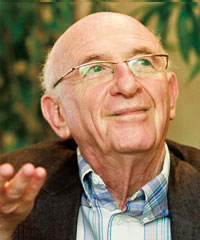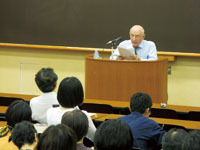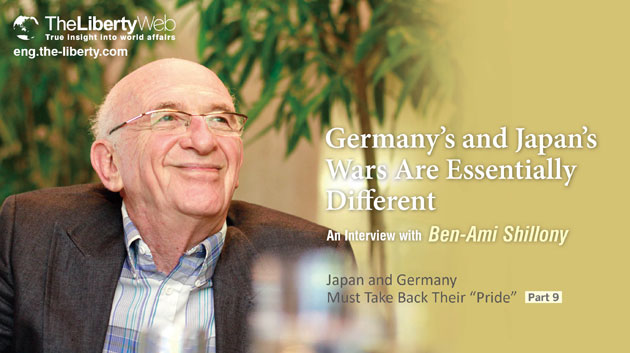Germany’s and Japan’s Wars Are Essentially Different
An Interview with Ben-Ami Shillony
What was the difference between Japanese and German actions during World War II? Ben-Ami Shillony is a Jewish Professor who escaped the Nazi’s Holocaust, and has written a number of Nihonjinron works. We interviewed him.

Ben-Ami Shillony
Hebrew University Professor Emeritus and Historian
Born in Poland, 1937. Escaped the Holocaust and moved to Israel. Completed Masters at Hebrew University. After earning his Ph.D. from Princeton in the U.S>, became professor in Oriental studies at Hebrew University in 1972. His works include, “Nihon no hanran ― seinen shoko-tachi to ni ni roku jiken (Kawadeshoboshinsha),”Hahanaru tenno ― josei-teki kunshu-sei no kako genzai mirai (Emperor as a mother)” (Kodansha), etc.

Shillony giving a talk on “Auschwitz and Hiroshima” at the Meijigakuin University, Tokyo, in July. After his talk in Japanese, he held a vigorous Q and A session with the audience.
— Japan and Germany were allies during World War II. What are your thoughts on the two nations’ wars?
Shillony (hereafter S): I think the aim of the wars were different for Japan and Germany. The aim for Japan was to create a Great East Asia Co-prosperity Sphere in eastern Asia. They were aiming for development where various ethnic groups would work together under Japanese leadership. Along the way there were tragic incidents, but I believe it was a great aim. On the other hand, Nazi Germany was evil, both ideologically and in what they did.
Furthermore, Japan’s war was between combatants, that is, it was an ordinary war. However, Germany’s Holocaust such as the Auschwitz concentration camp was entirely different. The massacred Jews were not combatants. The eradication of the Jewish ethnic group had nothing to do with war.
Moreover, even as Japan and Germany were allies, Japan helped the Jews. It is well known that people such as Chiune Sugihara, Kiichiro Higuchi, and Yosuke Matsuoka saved Jewish refugees, and many Jews admire Japan.
America Ought to Apologize to Japan
— Professor Shillony, you’ve done research on the atomic bombings. What got you interested?
S: It is a tragic topic, and is a very misunderstood subject. The President at the time, Truman, said, “The atom bombs were dropped to quicken Japanese surrender,” but it was not something that could be so justified.
“Japan was engaged in peace negotiations with Soviet mediators.
If Japan had accepted the Potsdam Declaration, then the bomb would not have been dropped, perhaps.
However, the reasons, why Japan did not accept it, were that America did not promise to maintain the Emperor system, it did not mention the use of the nuclear bomb, and the Soviet mediators, which the Japanese believed would help and then didn’t deliver on their promises as expected.
It was unethical and militarily unnecessary to drop the atomic bombs.
And at that time, the Soviets had not started war with Japan, and had not moved south, so that if America had properly stated the terms and its situation, and had quickly ended the war, perhaps China and North Korea would not have turned Communist. It could only be said that it was a failure on the part of America’s leadership.”
America, the victorious nation, did not apologize, nor did it compensate Japan. I think the time has come for America to apologize for this.
Japan Is Tolerant of Religions
— In your work you had written, “Japanese and Jews, who are neither Christians nor Caucasian, were met with discrimination.” Why did such discriminations exist? The colonial rule by Western nations was also accomplished under Christianity.
S: In the West’s colonial rule, many missionaries were dispatched. The aim was to convert the ethnic groups of those territories.
On the other hand, Japan was tolerant toward religion, including Christianity. There were even Christian Kamikaze pilots. Japanese did not even discriminate against Christians, a religion belonging to the enemy nation.
About why Japanese and Jews were discriminated against, it was because the white Christians had succeeded in modernization until that time and they had thought that “God had chosen the white race.”
However, Jews and Japanese had rapidly gained power. Since the Meiji Restoration, Japan had westernized, progressed in science, and things such as weapons were produced domestically. They colonized places like the Korean Peninsula as well. It was a miraculous speed of development.
This was unthinkable for white people, and so they imagined that the Japanese were up to something evil, and that they were trying to dominate the world.
In the white centered ideology, it was not acceptable for Japan to have colonies. However, why would it be evil for Japan to have colonies when the West had colonies? It’s quite understandable that the Japanese were angered by this.
No Hatred Towards Today’s Germany
— Lastly, what are your thoughts on the future of Jews and Germany? Should Germany continue to apologize?
S: Germany is the biggest economic nation in the EU. They may possibly become the leader. They did terrible things during World War II, but today, Germany and Israel have a very good relationship. Today’s Germany is different from Germany before the war. Jews do not hate today’s Germany. I believe they should continue to cultivate good relationships.
Related
- The Americans and Chinese Created"The Rape of Nanking", Spread Their Lies, and Falsified the Story Surrounding the "Nanking Incident", Which Made News Worldwide as a "Massacre": Japan and Germany Must Take Back Their "Pride" (Part 4)
- Japan Must Be Freed and Cleared of the Accusations Regarding Its WW2 Conduct :
- What has Germany Been Apologizing About?:Japan and Germany must take back their Pride" (Part 6)
- What About Germany and Japan Was Deemed to Be "Guilty"?:Japan and Germany must take back their Pride" (Part 7)
- Germans Want Japan to Continue to Be as Guilty as They Are……:Japan and Germany must take back their "Pride" (Part 8)



















